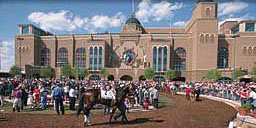|

|
 |
No Signs of Vesicular Stomititis at Lone
Star Park Lone Star Park at Grand Prairie officials reported Wednesday, May 26, that Texas Racing Commission veterinarians examined each of the 1,450 horses stabled in its barn area and none showed signs of vesicular stomititis (VS), the isolated viral disease that infected three horses on a nine-horse ranch nearly 500 miles southwest of the Dallas-Fort Worth area. "Because Lone Star Park is hosting important national stakes races on Memorial Day and the Breeders' Cup World Thoroughbred Championships this October, it's only natural that we pay close attention to this case, no matter how isolated and remote it is," said Lone Star Park Vice-President and General Manager Jeff Greco. "To cast fears aside, we asked the Texas Racing Commission to oversee these independent examinations so that horsemen around the globe could be assured that it's safe to bring their horses to Lone Star Park." The physical examinations were administered by a team, headed by Dr. Stewart Marsh, the chief veterinarian for the Texas Racing Commission. According to the Texas Animal Health Commission, VS can affect horses, cattle, pigs, and occasionally, sheep, goats and deer, causing blisters to form in the animal's mouth or along the hooves. The precautionary examinations were triggered May 19 when the National Veterinary Services Laboratory in Ames, Iowa, confirmed that three horses on a ranch in a remote and sparsely populated area near Balmorhea, Texas, had clinical signs of VS. Promptly, all livestock on the affected ranch - located approximately 480 miles southwest of Lone Star Park near the New Mexico border - will remain quarantined for several weeks, until they no longer pose a health threat to other livestock. Since the three horses were found to have clinical signs of VS on May 19, no other livestock in the area, including six additional horses and eight head of cattle on the affected ranch, have been diagnosed with the viral disease. Lone Star Park will continue to monitor the situation closely and all horses that enter the stable area will be examined by Texas licensed veterinarians to eradicate concerns about VS. |
| Back to News |
BENEVOLENCE | BENEFITS | GROOM ELITE | PERSONNEL | LINKS | CONTACT US
